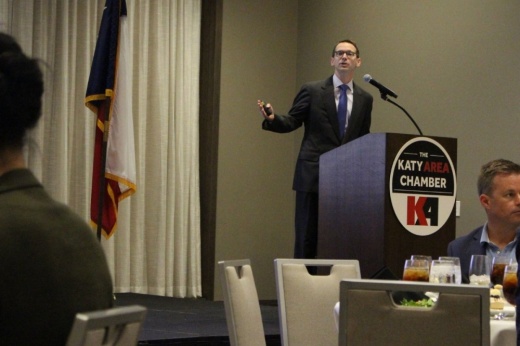At the Katy Area Chamber event, Morath provided a high-level overview of reading proficiency and overall student performance across the state’s public education system and spoke to the TEA’s key priorities.
The four key priorities Morath identified relate to the “gargantuan challenge of supporting 5.5 million souls across our schools,” he said. These were:
- Recruiting, supporting and retaining teachers and principals;
- Ensuring the state’s youngest learners master the fundamentals of reading and math to eliminate educational gaps;
- Developing rigorous and relevant high school curriculums; and
- Improving the trajectory of low-performance schools.
Although some data shows a pattern between socioeconomic status and reading proficiency exists, “poverty is not destiny,” he said.
To intentionally address literacy, Morath said Texas educators must rely on the cognitive science model that decoding, or the phonics portion of reading, and language comprehension—which he described as every word in a person’s vocabulary—are the skills necessary to learn to read.
Morath said educators of early learners should align their curriculums to the science of reading. Such elements include:
- Rigorous instruction;
- Explicit, systematic direct instruction;
- Vocabulary complexity;
- Knowledge coherence, as opposed to “skill proficiency;” and
- Writing.
“Until we get relentless about addressing this problem, we will still see huge gaps by race and by class,” Morath said. “We will still see the haves and the have nots. We will still see lower levels of reading proficiency that our children do not deserve, because we will not be educating them in a way that they can be educated.
Morath acknowledged Katy ISD as a local leader in executing these changes to curriculum, highlighting the district’s 2022-24 strategic design plan.
“Katy is going through ... this process of the significant overhaul and evaluation of reading practices to align with the current science. This is not easy to do and not necessarily popular, ... but it is necessary” Morath said. “It is what our kids deserve. Our kids will thrive when they are given leaders that meet their needs.”
Indeed, Sanèe Bell, Katy ISD assistant superintendent of teaching and learning, said the district’s redevelopment of its elementary literacy framework was intentionally aligned with statewide initiatives, such as House Bill 3 Texas Reading Academies.
“The goal of the Texas Reading Academies is to provide educators with the essential skills needed to ensure children develop a strong foundation in reading and writing, and that instructional materials and practices are grounded in the science of teaching reading,” Bell said.





